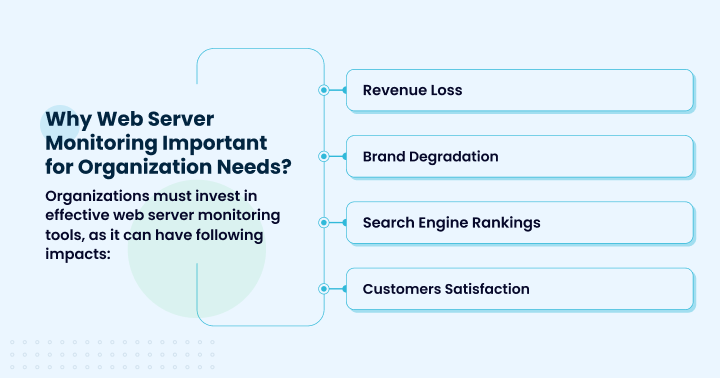Why Web Server Monitoring Important for Organization Needs?
Before we get into the web server monitoring and management or why it’s needed, I would just ask a question.
Downtime and slow page loading time is the result of inefficient web server resources or backend IT infrastructure outage. Uptime of web servers (Apache, IIS, NGINX etc.)
matters a lot irrespective of the fact that whether you are running a corporate, personal, eCommerce, blogging or any other website. It adversely affects both tangible (i.e. sales) and intangible (i.e. Brand) assets of the company.
Organizations must invest in effective web server monitoring tools, as it can have following impacts:
- Revenue Loss
- Brand Degradation
- Search Engine Rankings
- Customers Satisfaction
Let’s take a real example of Amazon, world’s largest online retailer that faced downtime of two hours in June, 2008.
By rough estimates, Amazon lost $30,000 per minute and this number will be bigger if that happens today because since then Amazon’s revenue has grown to $107 Billion (2015) from $19 Billion (2008).
Some downtime statistics:
Companies experience an average of 501 hours of network downtime every year and the overall downtime costs an average of 3.6% of annual revenue. [Source: The Costs of Enterprise Downtime, Infonetics Research]
20% of small to medium businesses will suffer a major disaster causing loss of critical data every 5 years. [Source: Richmond House Group]
Now it is clear how important it is to have web server monitoring in place to avoid downtime.
Below are the top 4 reasons why organization need effective web server monitoring.
1. Revenue Loss
If you have an ecommerce or online business website then this should be your top concern.
When a potential customer comes to make a purchase and website is not working or taking too long to load, they will leave the website with disappointment. This can be especially detrimental for dropshipping websites that rely heavily on quick and seamless user experiences.
A potential customer might go to the competitor website make the purchase.
Be versed with the fact that online business is highly competitive today.
CA Technologies carried out a survey about downtime and revenue loss, below are some the key statistics,
Small Enterprise lost more than $55,000 in revenue due to IT failure each year
Midsize Enterprise lost more than $91,000 in revenue due to IT failure each year
Large Enterprise lost more than $1,000,000 in revenue due to IT failure each year
In that study, CA Technologies chose 200 companies from North America and Europe region.
Result says these companies lose around $26.5 Billion in revenue each year due to downtime.
2. Brand Degradation
Website is the face of the company — accessible 24*7 using any device, anywhere.
Branding needs to provide consistent, authenticated and trustworthy message about your organization and product.
Businesses should create a logo, colors, and other branding assets, incorporating symbols and meanings, to establish a recognizable identity.
Businesses need to maintain their brand identity to sustain and grow in market.
Now a days, 90% purchase journey starts with digital channel even if purchase requirement is B2B.
Suppose a potential customer comes to your website via referral, search engine, advertising or any other channel and they figure out website is not working.
First impression is the last impression. They might not consider you as a vendor option. A Slogan Generator can help businesses craft compelling taglines that reinforce brand identity and leave a lasting impression on visitors.
Recommended: How to Select Server Monitoring Software?
3. Search Engine Ranking
In digital era, purchase journey starts with searching on web, marketers need to stay on top and rely on search engine optimization. Most search engines consider downtime and page load time in website ranking.
If search engine tries to index your website when it is down, it will adversely affect website rank tracking
Web server performance issues will affect page load time. Since 2010, Google has started to consider page load time directly into search algorithms.
Slow page load time is more dangerous than downtime because damage caused by slower load time is long-lasting.
4. Customer Satisfaction
Besides above mentioned impacts, website downtime also gives negative experience to the visitors who are regular or existing customers.
In-spite of established brand, reliable product/service and attractive pricing, negative experience caused by poor website performance can create trust deficits.
Unsatisfied customers tend to spread more negative word of mouth than satisfied customers.
There are the that prove that your organization needs web server monitoring.
If you are thinking to start to use web server monitoring software then go with Motadata.
Motadata has web server monitoring as one of the features built-into its unified platform for IT infrastructure monitoring.
FAQs:
Web server monitoring is the process of tracking and analyzing the performance and health of a web server. It involves monitoring key metrics such as response time, uptime, CPU usage, memory utilization, and network traffic.
Web server monitoring is crucial for ensuring optimal website performance, preventing downtime, and maintaining user satisfaction. It helps organizations identify and address potential issues before they impact their business operations.
Some essential metrics include:
- Response time
- Uptime
- CPU usage
- Memory utilization
- Network traffic
- Error rates
- Disk I/O
- Database performance




